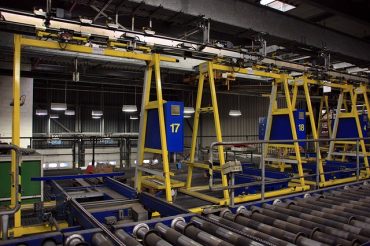
Organizations can unlock immense benefits with the industrial metaverse by coupling responsible innovation with pragmatic change management.
The metaverse is poised to transform nearly every industry; its industrial applications, in particular, may increase efficiency, reduce waste and costs by enabling businesses to simulate and optimize processes, including manufacturing and supply chain activities in a virtual environment. It is a combination of human-led and tech-powered solutions which merge physical and digital environments along with centralized data that could cover information from manufacturing floors to customer demand and supply chain.
While many organizations want to take advantage of it, managing adoption challenges due to skepticism and fear of change from stakeholders will be critical for success.
Even though applications of the industrial metaverse might vary based on the specific industry and business model, there are a few best practices organizations should follow to capture all benefits offered by the technology. Specifically, business leaders must develop an intentional, results-driven, and paced approach to industrial metaverse adoption that prioritizes trust and transparency among all stakeholders inside (including different functions, the workforce, and executives) and outside (including suppliers, customers and, as applicable, cloud providers as is the case for a manufacturing metaverse for example) the company. Further, upskilling of the workforce will be critical for successful adoption.
See also: The ‘Industrial Metaverse’ is Actually Starting to Form
Addressing Top Concerns of the Industrial Metaverse
Any emerging technology adoption requires change management – a framework that prepares and supports members of the organization for how to achieve the desired transformation. Stakeholders often fear the unknown and favor familiarity over uncertainty. It is crucial for business leaders to help employees and other stakeholders understand, upskill and equip them for the anticipated changes, and ensure that they are supported in areas where there are still unknowns.
This begins with understanding employees’ and other stakeholders’ main concerns around two key barriers in adopting the industrial metaverse: security and skills development.
PwC’s Metaverse Survey found that both consumers and executives identify cybersecurity as the top concern holding them back from adoption. Exacerbating this concern is the fact that cybersecurity is not keeping pace with the development of the industrial metaverse. As such, business leaders must remain extra mindful of cybersecurity measures. They need to develop secure architecture (informed by up-to-date threat intelligence), implement new controls designed for digital assets, and secure their metaverse supply chains by rigorously assessing the terms and representations of contracts and licenses and ensuring the most accurate monitoring of all metaverse activities.
Skills management is another area that often sparks concerns about the industrial metaverse from employees, many of whom fear that they do not possess the necessary skills to operate the new technology. Adding onto these concerns, industrial metaverse technologies are continually evolving, making it difficult to identify the optimal skills and security tools required for successful operation.
Inevitably, technological transformation will require the development of new skills, as well as the adoption of new roles and responsibilities. It is important that the entire organization aligns on expectations, beginning with leadership and cascading down to other key stakeholders, to ensure sustained morale and business results.
Apprehensions around cybersecurity and upskilling for the industrial metaverse can slowly be broken down with balanced and transparent messaging that addresses risk and mitigation tactics ranging from the organizational to the individual level.
See also: There’s Gold in the Metaverse Hills, But it Needs to be Mined Thoughtfully
Implementing the Industrial Metaverse
While every organization is eager to drive results through the industrial metaverse, it is important that they implement the technology with a thoughtful and pragmatic change management approach centered around business objectives and addresses any skepticism leaders may have, as well as mitigate risks. Adopting technology to simply check a box and limiting the efforts and engagement to particular manufacturing or operations team is not enough to sustain a successful foray into the industrial metaverse, nor will a company reap the benefits from the technology.
Grounded in business and strategic objectives, this plan must be implemented gradually and thoughtfully. Metaverse technologies and applications are rapidly evolving, so organizations must remain vigilant when implementing technology and other changes to ensure evergreen benefits, even in the face of new innovations. Additionally, a steady approach provides flexibility for iterative experimentation and continued improvements. As the technology integrates into the organization, leaders can implement purposeful adjustments and additional investments that make the most sense based on the initial results.
Importantly, these results cannot be fully achieved without the proper change environment centered around collaboration and continued improvements. This means providing upskilling initiatives for employees focused on maintaining a workforce and culture that is open to new technologies and continuous learning and development. These programs will demonstrate the possibilities opened up by the industrial metaverse, as well as increase confidence and faith in change.
See also: Here Comes the ‘Industrial Metaverse’
Benefits of the Industrial Metaverse
By coupling responsible innovation with an intentional and pragmatic change management approach, organizations across industries can unlock immense benefits with the industrial metaverse.
Despite varying use cases based on business models, all organizations can unlock improved collaboration capabilities. The post-pandemic world is much more dispersed, complex, and diverse than ever before, making remote collaboration enabled by the industrial metaverse extremely valuable in unifying the workforce and tapping into distributed talent pools.
The industrial metaverse will also bring enhanced upskilling capabilities. In fact, PwC found that when leveraging virtual and augmented reality for training, the time it took for employees to become proficient in a skill improved by 275%, which in turn increased confidence, focus, and emotional connection.
Adding to the improved employee experience, the industrial metaverse enhances safety both within the organization and for end users. For example, AR-enabled remote assistance might allow organizations to provide customer support in risky situations while also tapping into expertise from around the globe.
Applications Across Industries
Notably, there are certain sectors – like manufacturing, engineering, and healthcare – that are particularly positioned to benefit from the industrial metaverse.
For example, manufacturing often requires scarce, raw materials. With a virtual simulation of a manufacturing facility, organizations can cut back on resource waste by modeling out supply chain and logistics processes that are often fraught with inefficiencies.
Furthermore, prototyping is often an inefficient and wasteful process that engineers grapple with. The industrial metaverse can solve for resource challenges by allowing for the creation of virtual models that don’t need to be built from scratch and can be adjusted easily.
In the case of healthcare, the industrial metaverse has the potential to improve patient experiences, care delivery, and outcomes. These results are being driven by emerging concepts such as medical simulations for training purposes and digital twins of human organs or bodies that can monitor health, identify diseases early on and deliver targeted medical responses.
No matter the type, size, or function of an organization, the industrial metaverse will undoubtedly transform the way employees interact with each other and with customers as well as suppliers; decrease the wastefulness of core business processes; improve worker safety and expedite upskilling required to capture the benefits of the industrial metaverse.
All of these benefits and more are available to organizations that prioritize stakeholder trust through risk mitigation and transparency while approaching the technological transformation with a results-driven, thoughtful mindset.





























